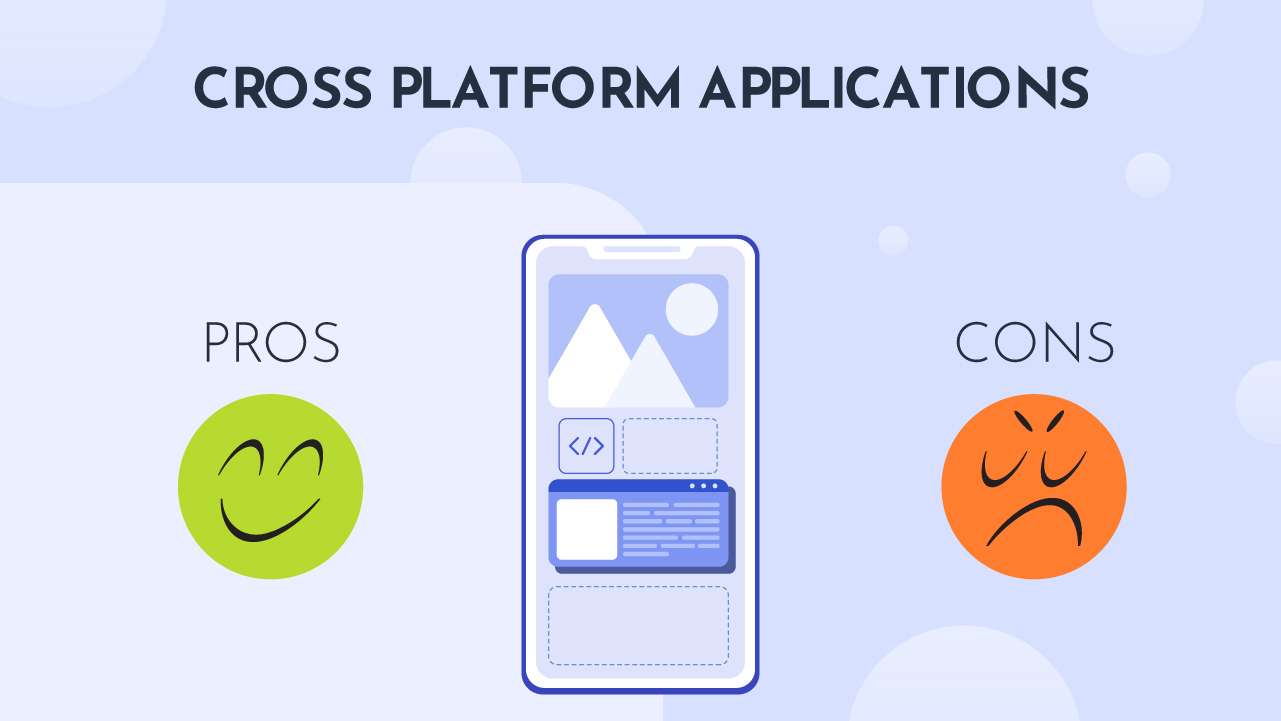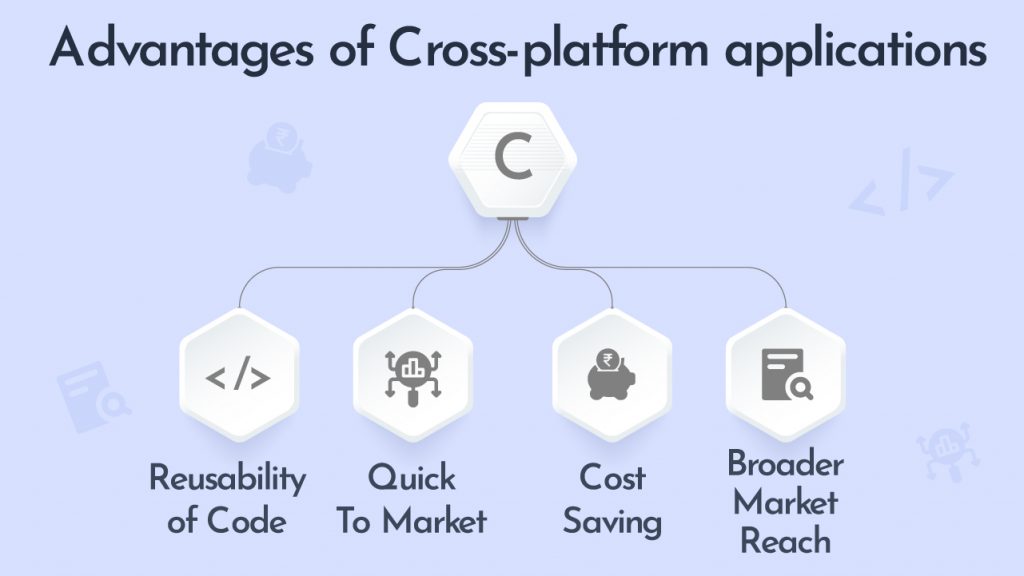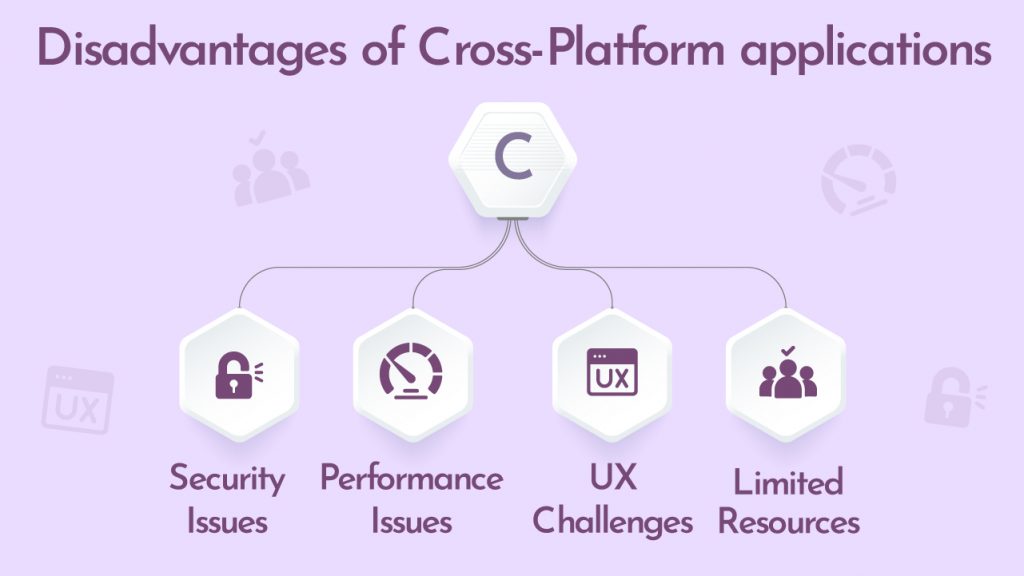Cross Platform Applications – Pros & Cons

What are cross-platform apps?
In layman’s language, a cross-platform approach is creating an app that will be compatible with the major operating systems like Android, iOS, macOS, and windows. It is also considered an alternative to native app development. Applications like Whatsapp, Facebook, Instagram, etc are cross-platform apps. These applications are made available for both Android and iOS users.
The applications in a smartphone are native apps by default. Their codes are written in different programming languages depending on the operating application. For Android, generally, Java and Kotlin are used, while for iOS Swift and Objective-C are used. The whole point of the cross-platform is looking for opportunities to leverage different platforms. In short, the cross-platform application framework tools are used by the developers to create apps with one-time coding and run it across all platforms.
Pros & Cons of a Cross-Platform App
With the pandemic overtaking the real world, the growth of the virtual world was inevitable. The app development business approach evolved with the evolution of cross-platform mobile applications. One has to decide which device it should be supported on before application building. Choosing one operating system over another comes with certain costs. It also includes either risking losing a portion of the market share.
To be perceived as a top player in this competitive market, it is crucial to take advantage of the right resources. With the continuous technological up-gradation and customer-driven progress, organizations are finding ways to balance long-term growth with short-term challenges.
Advantages of Cross-platform applications:

- Reusability of code: This removes the repetitive tasks and speeds up the development cycle. Developers can use this to save time for their day-to-day challenges. Using reusable codes also enables the developer to resolve bugs and add enhancements across all platforms in one go or by doing it separately.
- Cost Saving: In native development, the organization has to assemble multiple teams with different skill sets and thus increase the budget to cover the application development for different operating systems. On the other hand, the cross-platform framework allows sharing of common technical and human resources, which makes it possible to develop a more efficient application at a less expensive rate.
- Quick to market: When a customer interacts with an application, they expect it to find the same seamless user experience, across different operating systems. Failing to do so, will make the customer look for alternatives. As cross platforms can use a shared code base, it speeds up the product development and launch. It also helps in the product being more responsive to the feedback & market changes.
- Broader Market Reach: The most important advantage of developing a cross-platform app is that deploying it on multiple platforms broadens the market reach. By tapping both android and iOS platforms, you can cover almost 98% of the entire mobile user landscape. It’s simply a matter of multiplying revenue opportunities.
Disadvantages of Cross-Platform applications:

- Security Issues: The advancement in technology has not only brought an upgrade in our lifestyle, but it has also exposed us to cyber risks. Native applications rectify their loopholes with frequent updates, while the same is not the case with cross-platform apps. Thus if dealing with huge corporate or business data, it is advised to opt for native apps.
- Performance Issues: Certain cross-platform apps might face performance issues due to the integration problems on certain operating systems. This is majorly due to the lack of compatibility between the native and non-native components of the devices. The performance of these apps is comparatively on the lower side than their native counterparts.
- UX Challenges: A user might be discouraged to engage further if the app has a slow loading time and performance-related issues. Not all cross-platform apps have a good user interface, but at times they simply can’t match the seamless performance of a native application.
- Limited Resources: For an app developer, it can get difficult to bring in cross-platform compliance as the developing tools for such apps are limited. Android and iOS platforms come up with more advanced updated versions and thus the cross-platform apps are left lagging.
Opting for a cross-platform application or not is an endless debate. Get yourself a strong development team, who not only develops the application but guides you through the need to analyze and be a part of this tricky decision. Get in touch with us today!!



